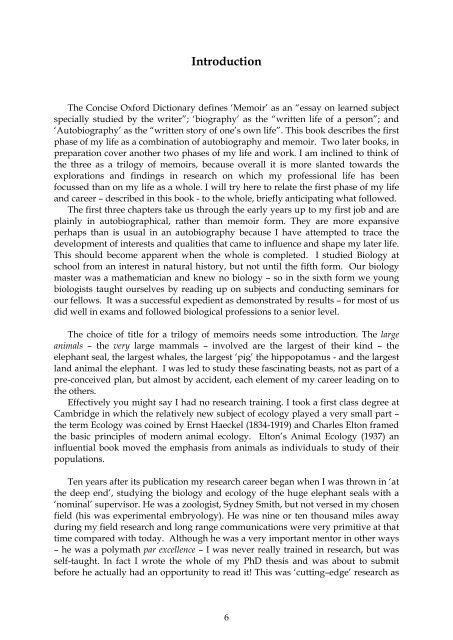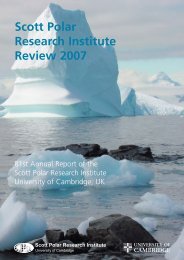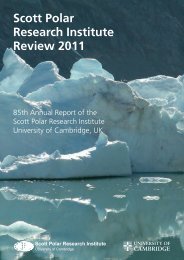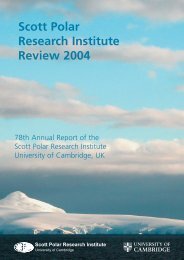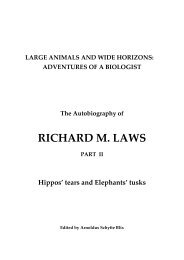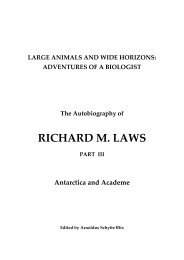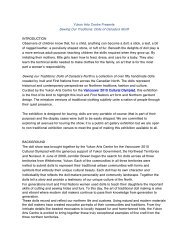- Page 1: LARGE ANIMALS AND WIDE HORIZONS: AD
- Page 5: FOREWORD When Richard M. Laws retir
- Page 9 and 10: y insurance assessors, were new to
- Page 11: unique. That has been my good fortu
- Page 14 and 15: went to live in Western Australia;
- Page 16 and 17: not leaving her much when he died.
- Page 18 and 19: Dad exacted retribution for such wr
- Page 20 and 21: I was very fond of my father but, t
- Page 22 and 23: highlights of the holiday was alway
- Page 24 and 25: If we were lucky we would see a few
- Page 26 and 27: dentists for many years to come. At
- Page 28 and 29: didn't have much time for cricket,
- Page 30 and 31: on his car radio two days later, as
- Page 32 and 33: quite heavy traffic. We settled int
- Page 34 and 35: a good photographer and started me
- Page 36 and 37: Under great oak trees snowdrops, pr
- Page 38 and 39: illustrated with my pen-and-ink dra
- Page 40 and 41: ut was playing rugby again a week l
- Page 42 and 43: won a large number of decorative sc
- Page 44 and 45: of a dog perhaps . . . " So clearly
- Page 46 and 47: celebrity, for his avant-garde art.
- Page 48 and 49: One day in April l942 I cycled on m
- Page 50 and 51: Another day I particularly remember
- Page 52 and 53: Progress of the war as seen from Pa
- Page 54 and 55: wounded by mortar shrapnel - abdomi
- Page 56 and 57:
service was deferred for students u
- Page 58 and 59:
a limited membership of about twelv
- Page 60 and 61:
experienced and some of them had a
- Page 62 and 63:
his delightful pen and ink drawings
- Page 64 and 65:
and classification, taught by [Paul
- Page 66 and 67:
text, had acquired a collection of
- Page 68 and 69:
Hancock had been a famous Northumbe
- Page 70 and 71:
was closed to all traffic, the Back
- Page 72 and 73:
The glorious Summer of l947 Meanwhi
- Page 75 and 76:
Chapter 4 Falkland Islands Dependen
- Page 77 and 78:
provoke me, but I took a dislike to
- Page 79 and 80:
Surgeon Commander E W Bingham, RN,
- Page 81 and 82:
that the ship would be ready to sai
- Page 83 and 84:
Chapter 5 To Sea in a Tub: Voyage o
- Page 85 and 86:
I had a very good night's sleep, de
- Page 87 and 88:
when I went down to my bunk as the
- Page 89 and 90:
silver fish, perhaps 4-5 ft long wa
- Page 91 and 92:
Captain's launch came alongside and
- Page 93 and 94:
frigate petrel or white-faced storm
- Page 95 and 96:
Oh! I love to waddle waddle On the
- Page 97 and 98:
sisters of uncharity the things tha
- Page 99 and 100:
Another fine day came, with it a bi
- Page 101 and 102:
eported for the Bosun's party and w
- Page 103 and 104:
cruised alongside the ship for a fe
- Page 105 and 106:
the only real seaman in the crew. H
- Page 107 and 108:
starboard three miles away. It had
- Page 109 and 110:
William, which looked rocky enough.
- Page 111 and 112:
A short walk down the road led us t
- Page 113 and 114:
several cassettes and Dennis Hallet
- Page 115 and 116:
which was attached to a slimy grey
- Page 117 and 118:
oomed FIDS base hut. We were surrou
- Page 119 and 120:
Chapter 6 Signy Island : Settling i
- Page 121 and 122:
Before going further some backgroun
- Page 123 and 124:
surrounding the high ground on near
- Page 125 and 126:
lack-ridged "helmet" between Marsha
- Page 127 and 128:
Settling in A new way of life. The
- Page 129 and 130:
torquoise evening sky and the peaks
- Page 131 and 132:
spacious loft above for storage pur
- Page 133 and 134:
thicken. All day as we worked the s
- Page 135 and 136:
following the coast. In my inexperi
- Page 137 and 138:
Rocks, Ralph rowing and Derek perch
- Page 139 and 140:
It proved impossible to travel alon
- Page 141 and 142:
Another day in the middle of May be
- Page 143 and 144:
sketches (the Twins and the Cuillin
- Page 145 and 146:
On another fine day at the end of A
- Page 147 and 148:
Chapter 7 Signy Island: Life on Bas
- Page 149 and 150:
stove. A galvanized hip bath was a
- Page 151 and 152:
the trouser problem was not yet sol
- Page 153 and 154:
might have to get up during the nig
- Page 155 and 156:
kill and post mortem some seals for
- Page 157 and 158:
one morning. It was a large nail an
- Page 159 and 160:
These kinds of minor problems recur
- Page 161 and 162:
For sledging, a winter activity des
- Page 163 and 164:
on weight, although we were doing h
- Page 165 and 166:
The long winter evenings when, it h
- Page 167 and 168:
condensing provided an artificial h
- Page 169 and 170:
photographs. My agreement with the
- Page 171 and 172:
idge was silhouetted against a dark
- Page 173 and 174:
of soft snow over ice, which requir
- Page 175 and 176:
Chapter 8 Signy Island: Sea ice and
- Page 177 and 178:
all morning and intermittently duri
- Page 179 and 180:
some of the roofing-felt on the lab
- Page 181 and 182:
through the day until at 8 o’cloc
- Page 183 and 184:
y 6 enclosing some large tabular be
- Page 185 and 186:
north to south. The wind remained b
- Page 187 and 188:
efore I had remarked how vivid were
- Page 189 and 190:
patches. The sun came through for i
- Page 191 and 192:
A very fine morning now came, with
- Page 193 and 194:
straight-edge of purple cloud to th
- Page 195 and 196:
Chapter 9 Coronation Island: More d
- Page 197 and 198:
the interior. In the rocks of the o
- Page 199 and 200:
get some rock specimens from the so
- Page 201 and 202:
delicate colouring - in parts a ver
- Page 203 and 204:
The only Kandahar bindings we had w
- Page 205 and 206:
On 24 August we went through the sl
- Page 207 and 208:
dawn. We were tired that morning, t
- Page 209 and 210:
loud explosion, which rattled him.
- Page 211 and 212:
penguins but I saw no more birds. T
- Page 213 and 214:
11.Scientific: 1 collecting jar (70
- Page 215 and 216:
cooking took quite a time as water
- Page 217 and 218:
above sea level. The rock walls ros
- Page 219 and 220:
and made our way down the West side
- Page 221 and 222:
eak so we decided to travel back al
- Page 223 and 224:
one we called the ‘Finsterarhorn
- Page 225 and 226:
Chapter 10 Earth Sciences, Communic
- Page 227 and 228:
“The King Penguin” On re-readin
- Page 229 and 230:
petrel in the vicinity of Alexander
- Page 231 and 232:
the mail and two men who were to jo
- Page 233 and 234:
We said goodbye to Jim, and John st
- Page 235 and 236:
and learnt she was due at Signy nex
- Page 237 and 238:
Ministry of Agriculture and Fisheri
- Page 239 and 240:
enlarging photographs when the gene
- Page 241 and 242:
One day I had a long R/T chat with
- Page 243 and 244:
Then at the end of February just ov
- Page 245 and 246:
Chapter 11 Elephant seals, fieldwor
- Page 247 and 248:
We finished the census at 6.15 pm w
- Page 249 and 250:
seals on two beaches, for killing,
- Page 251 and 252:
and groans as the ice took the stra
- Page 253 and 254:
A few days later, Midwinter's Day,
- Page 255 and 256:
edge. Next day five cow elephants w
- Page 257 and 258:
About 4.30 pm I counted a bull and
- Page 259 and 260:
The cows squabbled among themselves
- Page 261 and 262:
A 'super' bull - the ultimate alpha
- Page 263 and 264:
ut she was unwilling and humped awa
- Page 265 and 266:
on the fringing cows, which were mo
- Page 267 and 268:
Chapter 12 Field work on other seal
- Page 269 and 270:
for a specimen, so Ralph and Derek
- Page 271 and 272:
number of Weddells, mostly pregnant
- Page 273 and 274:
then move on a few yards and repeat
- Page 275 and 276:
and 118 around the Gourlay Peninsul
- Page 277 and 278:
probably about two weeks old and st
- Page 279 and 280:
On 28 September we visited Gerd Isl
- Page 281 and 282:
Then one day I skied right around S
- Page 283 and 284:
Four days later I went over to Dryi
- Page 285 and 286:
Chapter 13 The Signy Island Birds,
- Page 287 and 288:
number and the address of the Colon
- Page 289 and 290:
came to within six feet of us, then
- Page 291 and 292:
chattering and stooping at the intr
- Page 293 and 294:
As a result of the prevailing low t
- Page 295 and 296:
contained no floes from the pack -
- Page 297 and 298:
fishy flavour and the meat was very
- Page 299 and 300:
ubbing; another black bird came up
- Page 301 and 302:
giants were in pairs at most nests
- Page 303 and 304:
about. As the New Year was approach
- Page 305 and 306:
I went over the plateau on 28 Janua
- Page 307 and 308:
slowly and heavily than the other b
- Page 309 and 310:
There were Giants and a few Dominic
- Page 311 and 312:
whether the darker birds were older
- Page 313 and 314:
I received a message from Bill Slad
- Page 315 and 316:
Chapter 14 Cambridge and the Falkla
- Page 317 and 318:
lighthouse, on a steady old horse
- Page 319 and 320:
island on which Santos stands. I we
- Page 321 and 322:
meant that I would take at least th
- Page 323 and 324:
PhD on cetacean locomotion, having
- Page 325 and 326:
that I had developed in me througho
- Page 327 and 328:
those pre-jet days. It was my very
- Page 329 and 330:
assorted crowd aboard and I wondere
- Page 331 and 332:
and white markings. Volunteer Rocks
- Page 333 and 334:
the islands in the old days: the tr
- Page 335 and 336:
extremity of the island and there w
- Page 337 and 338:
and West ends there are areas of lo
- Page 339 and 340:
Island and Beaver Island, and even
- Page 341 and 342:
to struggle overboard and were scat
- Page 343 and 344:
see their every movement against th
- Page 345 and 346:
Chapter 15 The Island of South Geor
- Page 347 and 348:
Radio Station was established in 19
- Page 349 and 350:
strip of blubber. The whole process
- Page 351 and 352:
coloration of the humpbacks, the ba
- Page 353 and 354:
An important part of my research wa
- Page 355 and 356:
On Good Friday, I woke at 6 o’clo
- Page 357 and 358:
Albatros right in to the wreck, whi
- Page 359 and 360:
The Brothers rocks) silhouetted aga
- Page 361 and 362:
the water's edge the gunner shot it
- Page 363 and 364:
It was now really dirty weather - A
- Page 365 and 366:
ace to catch up and we boarded her
- Page 367 and 368:
Chapter 16 Spring in South Georgia:
- Page 369 and 370:
Next day began as a glorious mornin
- Page 371 and 372:
At harem 8b (north of the main one)
- Page 373 and 374:
left their pups. I saw no pups bein
- Page 375 and 376:
latest news from King Edward Point:
- Page 377 and 378:
deep dissection at the base of the
- Page 379 and 380:
y some bulls early in the season? T
- Page 381 and 382:
On 3 October in area 6 bull A now h
- Page 383 and 384:
There was a detached group of 14 co
- Page 385 and 386:
ull coming out of the sea at one ha
- Page 387 and 388:
esearchers. We had some difficulty
- Page 389 and 390:
This both in terms of observing the
- Page 391 and 392:
The whaling season had started and
- Page 393 and 394:
Another sealing voyage. Shortly aft
- Page 395 and 396:
elephant seal, which have anything
- Page 397 and 398:
voyages, with the blubber 'burning'
- Page 399 and 400:
Chapter 17 Cambridge and the Arctic
- Page 401 and 402:
included as part of my thesis, beca
- Page 403 and 404:
plankton hauling on the first two s
- Page 405 and 406:
past. It was very clear water into
- Page 407 and 408:
was measuring the fish on deck duri
- Page 409 and 410:
We had 13 days holiday, inclusive o
- Page 411 and 412:
contained within a large hull desig
- Page 413 and 414:
Chapter 18 New ideas for Management
- Page 415 and 416:
eeding season for optimum condition
- Page 417 and 418:
parent vessel. When carcasses were
- Page 419 and 420:
catching to the breeding season. Fo
- Page 421 and 422:
with the exception of division II,
- Page 423 and 424:
population. This could only be a cr
- Page 425 and 426:
Estimates of total biomass at birth
- Page 427 and 428:
Of the six divisional collections o
- Page 429 and 430:
was probably the first time that su
- Page 431 and 432:
Chapter 19 A whaling voyage on Bala
- Page 433 and 434:
By the evening of 8 November we had
- Page 435 and 436:
the Southern Ocean. It turned a lit
- Page 437 and 438:
didn't reach the ship until 5.0 o
- Page 439 and 440:
more hectic. I spent the rest of th
- Page 441 and 442:
spermaceti, and the sperm oil likew
- Page 443 and 444:
was like that and reminded me of th
- Page 445 and 446:
actually it was quite early. It was
- Page 447 and 448:
arches. The operation was repeated
- Page 449 and 450:
them for later examination, but the
- Page 451 and 452:
around us now were huge gleaming wh
- Page 453 and 454:
A few days later I was due to go ou
- Page 455 and 456:
would be safer to remain on the bri
- Page 457 and 458:
predominantly under water for an ho
- Page 459 and 460:
I printed a few photographs for Cap
- Page 461 and 462:
Chapter 20 Marriage and Young Famil
- Page 463 and 464:
little odd and constrained at first
- Page 465 and 466:
of Edinburgh. The lecture I gave, o
- Page 467 and 468:
Chapter 21 Among Oceanographers, bu
- Page 469 and 470:
41. A new headquarters Building had
- Page 471 and 472:
I have mentioned that there were te
- Page 473 and 474:
always had Fraser as senior author)
- Page 475 and 476:
the north. Lots of gaily-coloured l
- Page 477 and 478:
- nearly half of the time available
- Page 479 and 480:
moving because there were no featur
- Page 481 and 482:
Chapter 22 Ron mor : the Great Seal
- Page 483 and 484:
along the coast. Many of the old Le
- Page 485 and 486:
and an inch thick, slightly soft, b
- Page 487 and 488:
The procedure was to approach the p
- Page 489 and 490:
earranging the weighting stones and
- Page 491:
hard work and we had to lower the p


